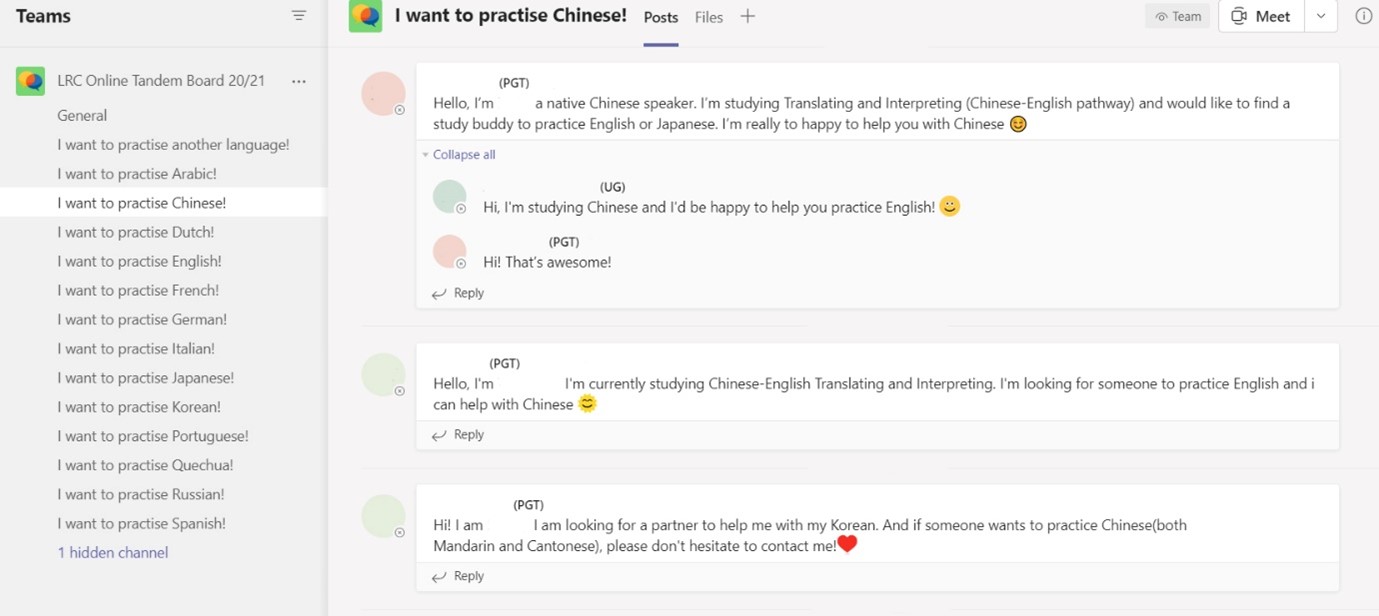Elina Vasina
Language Resource Centre
Who is involved?
Elina Vasina – Language Learning Support Officer + TEL Lead; Language Resource Centre Team
What did you do?
In the past we had a physical tandem board in the Language Resource Centre, where students could come in and pin up a notice to say what languages they spoke and what languages they wanted to practice. Users of the Centre would have a look at the board, find a notice and contact this person and, hopefully, they would set up a partnership where they could practice each other’s languages and help each other out in an informal setting in the centre or elsewhere.
With lockdown in March 2020 and no access to the physical centre, within a week we set up the online version of the tandem board to facilitate people being able to do language exchanges entirely remotely wherever they were.

How did you do it?
The very first step was deciding whether there was a need, and that was an immediate “yes”. Students were returning early from their year abroad. Students who had to potentially prepare for speaking exams without access to other resources.
The second step was to figure out how quickly this could be set up for people to put up their notices and how to secure it. It needed to be a secure platform, the choices were Canvas, other existing tools or something entirely new.
Creating something new from scratch was a huge job, we had to consider what the existing tools are that could be used, the main one being Microsoft Teams. It is readily available with no direct cost associated with it, other than just time. Everyone could login and everyone already has an account. It also could limit the number of people who would see other people’s contact details, because on something like Canvas we have almost 6,000 members. People may not want to post there so openly; they may want to post their information to a smaller group of people. Teams allowed private groups, not open to all students.
A form was set up which people could complete to request access by providing their details, their access would be authorised, and they would be added to the Teams where they could post on the most appropriate channels.
There was also a Code of Conduct and guidance documents put together in terms of what people should do, how they should use the platform, what they can expect, and information was provided to confirm their access to the Online Tandem Board. At that point it was pretty much hands off, as people can post there and people can say what they need.
Why did you do it?
From a management point of view, there was a very, very quick need to show that, although the campus was closed the opportunities for language learning were still there.
Autonomous learning and peer-to-peer support was still open and running. It was one of the first things that was up and running. It was really important that support was available for the students as quickly and as well as possible given the suddenness of the closing of campus.

Does it work and Student voice
Does it work, in short, “yes”.
Since the end of March 2020, the Online Tandem Board has had 360 requests for access. It then drops off in terms of visible posts as people create connections with others.
In terms of the numbers of languages, 22 languages were brought to the board essentially by people saying I speak these languages, I want to help others with these languages.
Next year (2021/22) there will be more tracking when requests come in, such as which languages are needed, and if there’s not enough activity for a particular language due to various other elements. Some targeted advertising may be used among our membership, the Student Union and various student societies, and other programs to try to make sure that people who are looking for practice are able to find exchange opportunities.
People are still joining the OTB, and it is an active community, and this will be continued in the future as an online tandem experience. This also has a lot to do with privacy and GDPR.
In terms of the language resource, the information and the data that is obtained informs us how to adjust services and how to better provide what students need in any academic year – because it’s always different year-on-year; depending on who is on campus and who is doing which stage.
“I found someone to help with my Korean even though I’m a beginner!! I’ll def sign up again next year”
“With the lockdowns I wasn’t able to go home during breaks. posted on the board looking for someone to speak with in Arabic and I sent her a DM. She was stuck in and didn’t get any chance to talk in Arabic over there. So we’ve been chatting every week and started watching Lupin together”
Graduate Framework
Contributes to the Graduate framework attributes, but particularly:
- Engaged
- Resilient
- Creative, innovative and enterprising
- Future focused
- Confident
